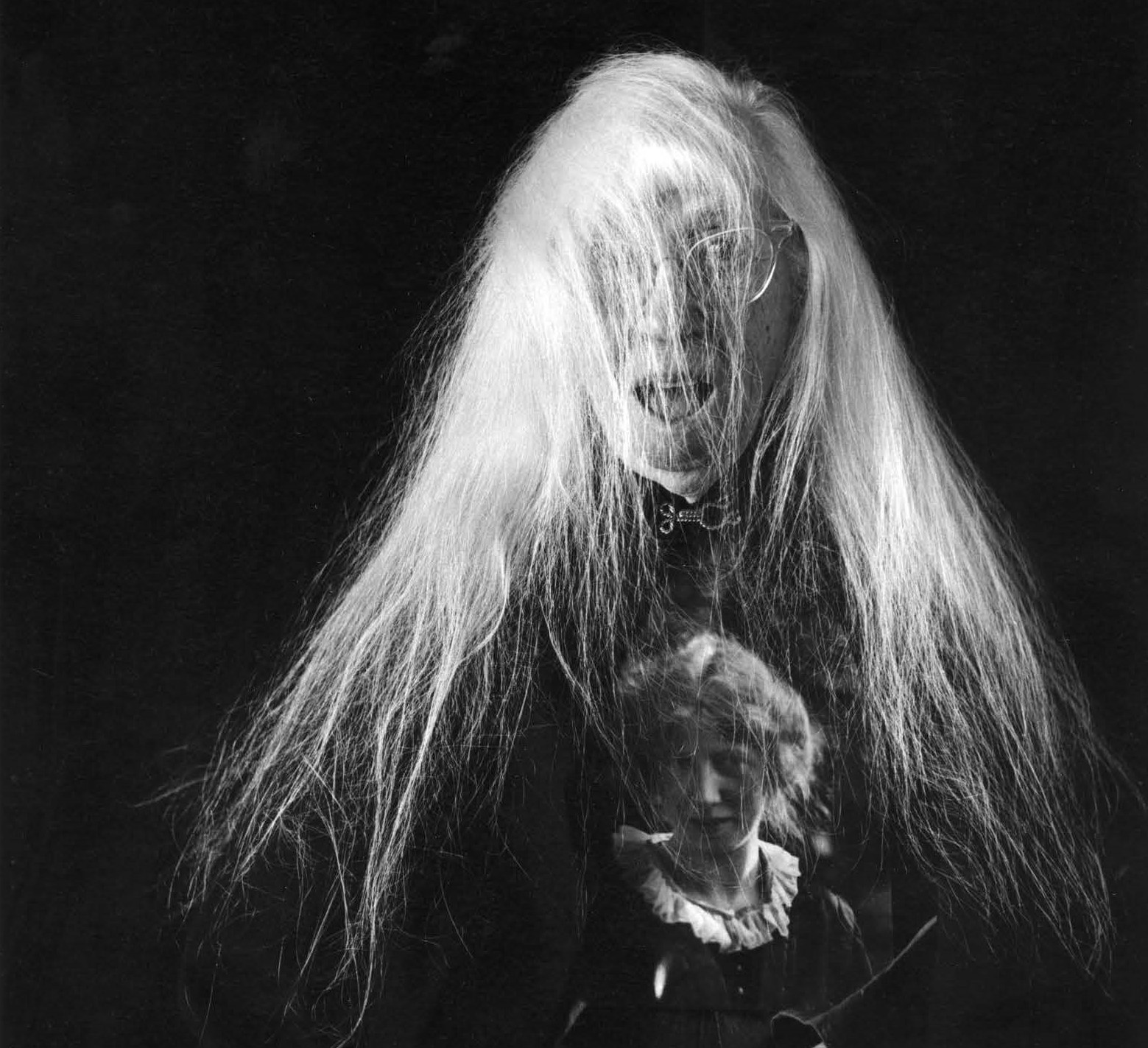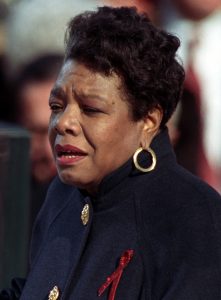
It was a very warm May day on the meadow at Mills. Our black robes were uncomfortable in the sun, but we loved our Oxford caps and white-and-yellow hoods draped over our shoulders. As with lots of aspects of Mills, the distinctive outfits made us, the graduating class of 1975, feel special. We sat up front on metal folding chairs, with our guests behind us. The crowd didn’t feel like a crowd, but rather was intimate, as befitted a small school with a small class. Just my parents and my boyfriend were somewhere back in the meadow, toward the main road.
Seated there was a very elderly, diminutive woman, dressed in black, with wild white hair and a pixie-ish expression, very quiet but observing everything carefully.
For a graduation (or Degree Day, another Mills moniker), it was a relatively relaxed affair, even with the excitement of Maya Angelou being our Degree Day speaker and being awarded an honorary degree. She was an imposing but not scary presence. Preoccupied with the sensory experience of the day, and perhaps the heat, I don’t recall much of what she said, but I like to think it was something akin to the theme of her quote, “You can only become truly accomplished at something you love. Don’t make money your goal. Instead pursue the things you love doing and then do them so well that people can’t take their eyes off of you.”
Maya Angelou at President Clinton’s inauguration, 1993
Why then, did my eyes keep drifting to a row of chairs in front of the stage, facing us? Seated there was a very elderly, diminutive woman, dressed in black, with wild white hair and a pixie-ish expression, very quiet but observing everything carefully. It was Imogen Cunningham, the photographer. She knew our campus well, having been married to Roi Partridge, who taught photography at the college in the 1920s. Her photos of the amphitheater and of dancers outdoors documented some aspects of the college, and she is well known for her self portraits and nature photos. Why she was at our graduation I don’t recall. She didn’t give a speech, or appear to whisper a word, for that matter, but might have been recognized by a speaker.
I couldn’t help feeling that, by her presence, I was experiencing a rite of passage. I was learning something, but I wasn’t sure exactly what. I was grateful that at age 92 she was at my graduation (in fact, she died a year later). But my attention shifted to the awards and diplomas being given out, and then to the lovely brunch we had on the lawn. We drank punch and ate strawberries dipped in chocolate, with everyone talking about their plans for the summer and for their future.
This rite of passage began a time of great change for me, moving into an apartment and working part time as a secretary while I went to graduate school at UC Berkeley, where my department was the size of the entire Mills College. Periodically over the years I would think about Imogen Cunningham sitting at Degree Day and wonder what was so compelling and what I was trying to learn from her. It’s only recently that the learning coalesced: how one can contribute by producing something of value based on careful observation rather than succeeding by talking. Maybe it’s my introverted nature, reticence on Zoom, and the nonstop media chitchat, but somehow I relish the idea of quiet artistic output more than ever.
A few days ago, when I looked in the mirror first thing in the morning, in a way I experienced an informal rite of passage: a recognition of aging and moving to another stage of life in this crazy era. I saw a not-so-young woman with wild, fly-away light gray hair and I couldn’t help thinking of Imogen Cunningham and her self portrait that’s the featured image for this story. Her art speaks for her, and in this world of jabber and noise, it speaks volumes.
I have recently retired from a marketing and technical writing and editing career and am thoroughly enjoying writing for myself and others.




Marian! Cunningham is one of my favorite photographers, and what you said about her effect on you speaks volumes … about you. She was an inspiration to you, and your words are in turn an inspiration to me as I’ve felt creatively stifled these last few weeks. The next time I look in the mirror I plan to remember your words, think about Cunningham at your Degree Day, recognize my own rite of passage, then go back to the drawing board, renewed, to make some quiet art. Thank you so much for this gorgeous, personal, and deeply satisfying story!
Thank you for your kind words, Barb, and it’s wonderful that Imogen Cunningham is an inspiration to you. I, too have been feeling creatively stifled this summer with all that was going on and the darkness of the fires. Now, being able to go out and take a walk again, I’m looking at flowers in the neighborhood and thinking of Imogen.
What a lovely story about your graduation, Marian. How amazing to have Maya Angelou as your speaker – I can’t even remember who spoke at mine. And I love the way the tiny woman in the front row, a famous photographer, was so meaningful to you just by her presence.
Thanks, Suzy. We were fortunate to have many amazing women on campus when I was at Mills. I find it interesting how someone’s mere presence can make an impression all these years later.
That self-portrait is amazing. She was so beautiful despite/because of her age. I can’t believe you also had Maya Angelou as a speaker. Next time I look in the mirror, I will try to focus on moving to a new era (old?) as something natural and beautiful rather than trying to see my younger self.
I get it, Laurie. Imogen had a wonderful perspective on herself. I’m trying to go with “gray pride” (I just made that up) because it’s been so distressing about what’s happening to us all physically because of the stress. It’s been liberating to go without makeup, although I still think I look better with it.
Marian, what an insightful story, as yours always are!
I’m not sure I’ve heard of Imogen Cunningham, but I have heard Maya Angelou speak. Many years ago she gave the keynote address at a librarians’ conference in Birmingham.
She spoke about her childhood, the traumatic experience that left her mute for years, and how she triumphed – the story she tells in her autobiography I Know Why the Caged Bird Sings. She was the most inspiring speaker I’ve ever heard.
Thanks, Dana, Maya Angelou was amazing in who she was and what she accomplished. Imogen Cunningham spoke through her images. Even with the visual resolution on the web, her photos are well worth a look.
Thanx Marian!
Just an amazing story about a truly memorable “Degree Day.” (I love the special monikers, just like at Harvard we got A.B. rather than B.A. degrees and we “concentrated” rather than “majored.”) And I am so glad that your day was memorable for all the right reasons while, as I recount, mine was memorable for all the wrong ones.
Thanks, John. My high school graduation was OK but very generic. Love the Harvard monikers. One of my other favorite Mills monikers was that, instead of calling the mentors for the freshwomen big sisters, they were “zippers,” to zip the young women into campus life.
As long as they didn’t call the male guests the “unzippers.”
Fortunately not, although by my second year, after the house mothers were all gone, there were many male guests on the weekends.
Very insightful story, Marian. As you remark, you have turned introspective, which inspires all of us as well. I have never heard of Imogen Cunningham, but really like what you have to say about her, and her visual imagery is amazing.
I understand about sitting in the heat and not paying attention to the speaker. The same thing happened to me at Brandeis a year earlier with Saul Bellow. I have no idea what he said; only that my nose got burnt! But I do like that you quote Maya Angelou above and offer up her words of wisdom. I can’t even do that.
Thank you, Betsy, l’shana tova.
My favorite parts of the crafting of this compelling narrative
are: (a) the details of what was served for brunch; being able to visualize the chocolate dipped strawberries brings the scene to life so much more than just leaving it as generic “brunch”; (b) the ending, in which you call back the image at the beginning, to which I had not paid much attention, and draw the reader in to some thoughts about your own development–and ours.
Thanks, glad you enjoyed the story.